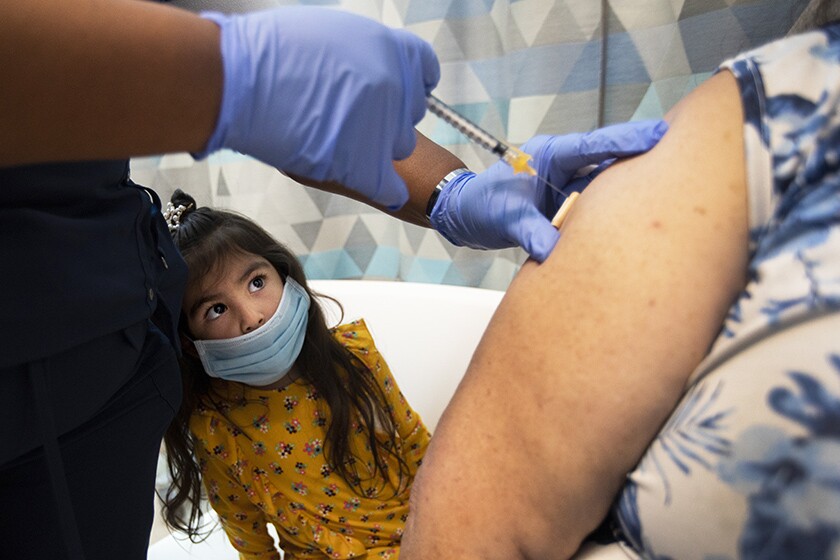Vaccinated parents extend COVID-19 protection to their children
[ad_1]

With COVID-19 as with life: when parents do it a few times, their children are protected.
New Israeli research shows that unvaccinated children whose mothers and fathers were fully vaccinated not only had parents who were less likely to get COVID-19, but also had a lower risk of becoming infected.
This protection was seen against the Alpha and Delta variants of the coronavirus. With Delta in particular, protection was stronger when parents had received a booster shot.
The new findings, published Thursday in the journal Science, underscore the importance of “domestic transmission” in maintaining the pandemic, as well as the indirect role that vaccination can play in protecting the most vulnerable members of a community.
Newsletter
Receive our free Coronavirus Today newsletter
Sign up to receive the latest news, the best stories, and what they mean to you, as well as the answers to your questions.
From time to time, you may receive promotional content from the Los Angeles Times.
It’s a parenting tip that can get some of the 30 million unvaccinated American adults looking for a vaccine, and the 47 million vaccinated adults who haven’t yet received a boost to roll up their sleeves again.
“If the individuals we talk to are very child-centered, some of that can persuade and reassure them,” said Dr. William Schaffner, an infectious disease specialist at Vanderbilt University.
Schaffner said he regularly tries to convince doubters about the vaccine that if they do not get vaccinated for themselves, they should do so for their families and communities. But with the toughening attitudes of the resistance, he said, most now reject the appeal and insist their children will also remain unvaccinated.
At two very different stages of the pandemic, research shows that children’s health was largely dependent on the indirect effects of the vaccine: to begin with, vaccinated parents were less likely to bring the coronavirus home. And when they did, it seemed that the vaccine made these parents less likely to pass it on to their unvaccinated children.
Stanford pediatrician Dr. Yvonne Maldonado said that for those who continue to question the need for vaccination, Israeli research offers strong evidence of its broader value. It shows that beyond self-protection, the decision to vaccinate is “especially important to protect our most vulnerable members, such as children under the age of 5 who cannot be vaccinated themselves,” Maldonado said.
Although children are less likely to become seriously ill with COVID-19, the U.S. Centers for Disease Control and Prevention estimates that 1,210 Americans under the age of 18 have died from the disease, including 387 who were 4 years old. or less. The Food and Drug Administration is not expected to give its emergency clearance to any vaccine for these younger Americans before March.
Older children also remain largely unprotected. Although a pediatric version of the Pfizer-BioNTech vaccine was approved for emergency use in late October, only 20.7% of children ages 5 to 11 are fully vaccinated. In November, a Kaiser Family Foundation survey found that approximately 30% of parents with children in this age group said they would definitely not vaccinate their child, and 7% said they would only do so if their school requires it. Another third said they wanted to wait and see how the vaccine works before deciding.
Meanwhile, 55.6% of American teens between the ages of 12 and 17 have received two doses of the usual Pfizer vaccine.
For the new study, researchers studied about 232,000 Israeli households with unvaccinated children over two 10-week pandemic periods. During last winter’s wave of infections with the Alpha variant, they found that unvaccinated children (most of whom were 15 years of age or younger) were 72% less likely to become infected when both parents were vaccinated that when neither.
When the more transmissible Delta variant ravaged Israel late last summer, unvaccinated children (then mostly 10 years or younger) were 58% less likely to become infected if both parents had three doses of vaccine that his fellow vaccinated parents had not been vaccinated against. I still received a boost.
The researchers made it clear that the protection they saw would probably also extend to older household members and those with conditions that weakened their immune systems, leaving them vulnerable to COVID-19.
They added that their findings validate long-standing beliefs about the role of vaccines in promoting “herd immunity”: that as a larger proportion of a community is vaccinated, transmission will fall and even all unvaccinated will get indirect protection from getting sick.
“Herd immunity also works at home,” said Dr. Paul Offit, a vaccine specialist at Philadelphia Children’s Hospital. “If you have a critical number of people in the household who are vaccinated, this works to slow down the transmission of the virus.”
For those who have an immunocompromised family member or an unvaccinated child at home, “you want to put a protective ditch around it” surrounding the individual of vaccinated people, Offit added.
In the study, having even one parent who was not vaccinated or who was incompletely vaccinated put children at a “substantially greater” risk of becoming infected. In cases where one parent was fully vaccinated and the other parent was not, vulnerable children saw only marginal reductions in their chances of becoming infected: 26% with the Alpha variant and 21% with the Alpha variant. Delta.
The results are based on other studies that have shown that vaccination protects people beyond the individual receiving the blow. An Israeli study found that unvaccinated spouses of health care workers were protected from vaccination by their spouse. Another measured vaccination rates in about 200 geographic communities in Israel, showing that as infections increased, infections among unvaccinated youth steadily declined.
“This is just a matter of common sense,” Offit said. It would be a persuasive selling point “in a world dominated by logic and reason, but sadly, we don’t live in that world,” he added. “People are practically closed right now.”

